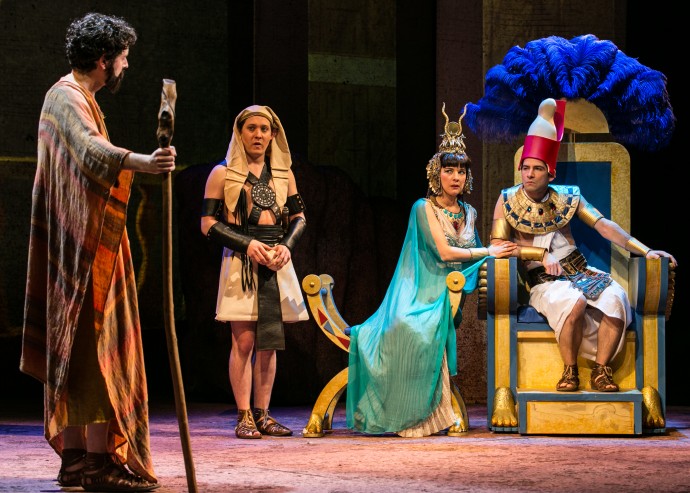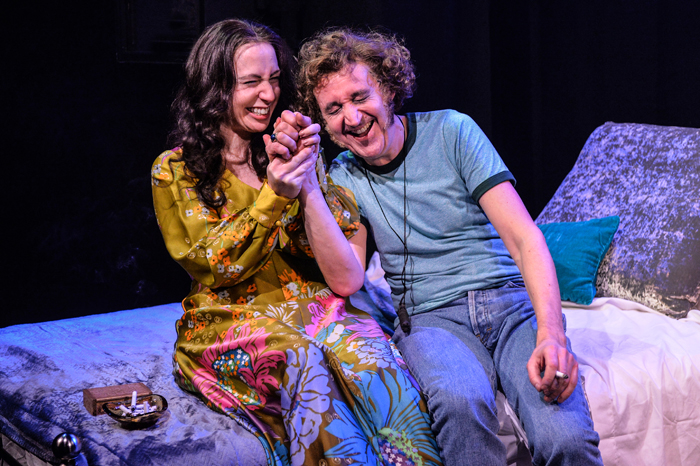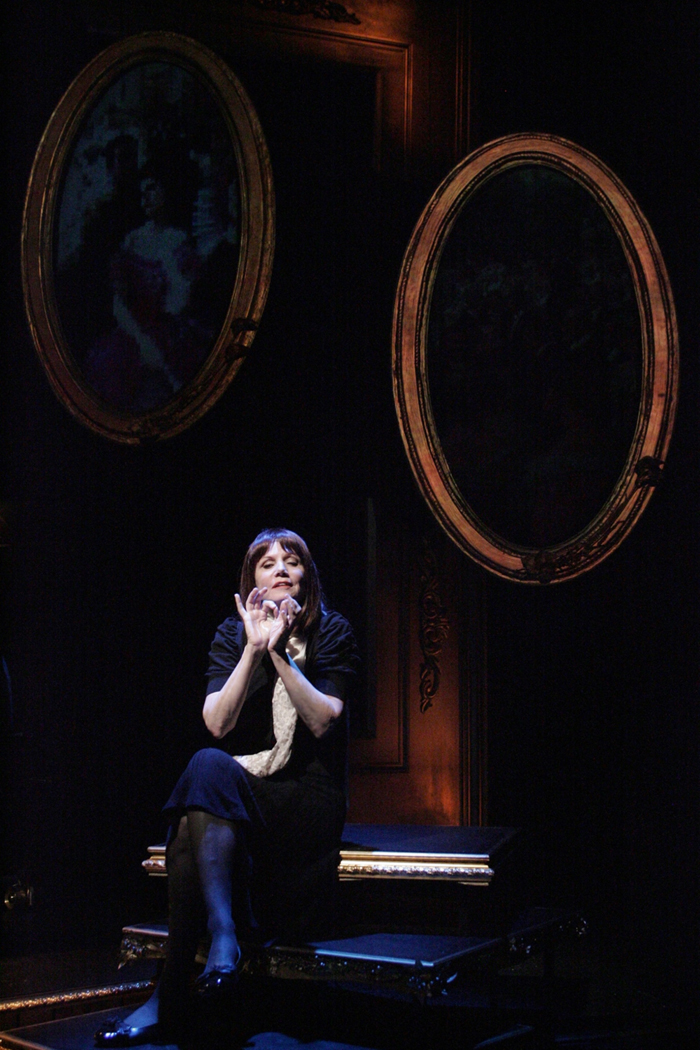 When is an opera a play with music? When it’s Simon Stephens’ sharp new reworking for the National Theatre of Brecht’s adaptation of John Gay's 1728 ballad opera (The Beggar's Opera). The perfect match of Kurt Weill’s thrilling, chilling music and Bertolt Brecht’s update of John Gay’s comic, heartless satire seems as timely and timeless as ever in Rufus Norris’s new production.
When is an opera a play with music? When it’s Simon Stephens’ sharp new reworking for the National Theatre of Brecht’s adaptation of John Gay's 1728 ballad opera (The Beggar's Opera). The perfect match of Kurt Weill’s thrilling, chilling music and Bertolt Brecht’s update of John Gay’s comic, heartless satire seems as timely and timeless as ever in Rufus Norris’s new production.
Brecht and Weill’s ‘play with music’, based on Elisabeth Hauptmann’s translation, opened in 1928, two hundred years after Gay’s first night. Brecht and Weill continued the short and intense collaboration that produced Mahagonny, Happy End and more in the years leading up to the rise of National Socialism. GW Pabst’s film adaptation of Die Dreigroschenoper opened in the more dangerous Germany of 1931, and by 1933, the Jewish Weill and his Austrian wife actor/singer Lotte Lenya (the first Polly) had fled Nazi Germany, emigrating to the USA by 1935, followed by Brecht and his Austrian Jewish wife, actor/director Helene Weigel (the first Mother Courage). Their ‘opera’ had pride of place in the ‘degenerate music’ exhibition curated by the Nazis in Dusseldorf in 1938.
Weill’s ‘avant-garde’ music for the show has become a vital part of our musical landscape but the unwieldy storyline has been wrestled by Stephens into a clearer plot in which London – and its underworld – pull out the stops for a coronation. There’s no consideration of financial crisis as there was in the original but it’s still a monumental fable of the corrupting power of unprincipled sex, money and violence, wrapped up in Brechtian mode for the modern audience.
Vikki Mortimer’s rough and ready design, all staircases and stage flats through which the cast hurl themselves, leaves plenty of space on the front of the vast Olivier stage for David Shrubsole's onstage band to take to that stage and for choreographer Imogen Knight to thread the 20 strong cast through the set. Her effectively grungy, louche costumes give the nod to Otto Dix’s paintings, but you might bump into any of this unsavoury lot in London 2016.
George Ikediashi (aka cabaret performer Le Gateau Chocolat) as the Balladeer, an imposing figure with a huge (yes, chocolatey) voice, gets the show off to a barnstorming start with the Ballad of Mack the Knife. His dark tale is told as a sort of Grand Guignol puppet show in a larger-than-life flimsy paper Punch and Judy booth – with ‘Mackie’ as a cross between Jack the Ripper and Mr Punch, his victim’s guts spilling colourfully over the booth. So the scene and tone are set for a tale that wears its heartlessness on its grubby, grungy sleeve by the time Nick Holder’s superb, exuberantly amoral Peachum gets to set out his stall, singing his Morning Song – with its delicious tune that Weill shrewdly realised he should lift straight from Gay’s original ballad opera. Peachum ruthlessly deploys his gangs of hooded beggars (divided into types 1-4: war veterans, immigrants, teenage runaways and unhoused lunatics) integrating hapless newbie Filch just in time for the rich pickings he anticipates at the forthcoming Coronation.
He'd like to be equally ruthless with his womenfolk at home, but Haydn Gwynne’s comically cartoonish Mrs Peachum is a match for him. She's drunken and randy, bent on revenge when she discovers her errant daughter Polly has eloped with one of her own squeezes, übervillain and gangleader Macheath. And she’s all angular limbs in black stockings and garters hardly covered by the clinging scarlet swathes of her dress as she crawls up a scaffolding ladder to find Polly’s ‘room’ at the top empty. But Polly is more than a match for both her parents – and pretty well anyone else who crosses her. The brainy, bespectacled lass in her purposeful cardie comes across as more than resourceful and articulate in Rosalie Craig’s stunningly intelligent and gloriously sung performance. Thankfully, Pirate Jenny’s Song (the tale of the servant girl who dreams of becoming a ruthless pirate who can order the deaths of the insulting bosses and customers she serves) is restored to Polly here (sometimes it is sung by the character Jenny Diver – of whom more later). It sends shivers up the spine, just as it should – no wonder Macheath’s gang listen in awe, stifling their sexist remarks and regarding his new bride with new respect. No wonder he makes her his ‘business partner’ with alacrity!
Central to this play with music is the infamous Macheath, described by Brecht as a ‘short, stocky man of about 40 with a head like a radish, a bit bald but not lacking dignity, someone who impresses women less as a handsome man than a well-situated one’. Rory Kinnear makes an impressive singing debut and it’s good to see the part played as Brecht intended rather than as a lovable rogue or misunderstood bad boy. Kinnear’s Macheath is no slacker when it comes to chilling and thrilling. His casual cruelty belies his fatal attraction to and for the ladies that will prove his eventual downfall. The thrills come from the melodious rounded tones of his singing voice, in this, his first sustained singing role.
Polly is well matched, by Debbie Kurup’s comically indignant foul-mouthed Lucy Brown, her rival in love, to whom Macheath has also promised himself and gives as good as she gets in their Jealousy Duet; and by Sharon Small’s Jenny Diver, the fragile, damaged tart with a wounded heart who shops Macheath to the Peachums. Small gets to sing Surabaya Johnny, a happy interpolation from Happy End – it’s such a great number that the ‘end’ seems to justify the means.
Peter de Jersey also impresses as Lucy’s father Tiger Brown, the gleefully corrupt Chief Inspector of Police who is hand in glove with Peachum, his old mucker from the armed forces– together they make a deliciously malign double act in this pantheon of vicious characters.
Director Rufus Norris shoves in all the usual Brechtian techniques, from props labelled 'DRUGS' and the cast shouting ‘scene change’ or ‘interval’ to remind us we are watching theatre and not real-life and they palpably add to the enjoyment of the opera as entertainment. But perhaps the sheer pace of the performance gives little space to reflect on the predicament of the characters and their reality in the theatre of life. This is left to powerful actor and wheelchair user Jamie Beddard, like so many disabled actors, a natural Brechtian, whose physicality and vocal quality is a constant reminder of his reality.
By Judi Herman
The Threepenny Opera runs until Saturday 1 October, 7.30pm & 2pm, £15-£45 at National Theatre South Bank, SE1 9PX; 020 7452 3000. www.nationaltheatre.org.uk



















